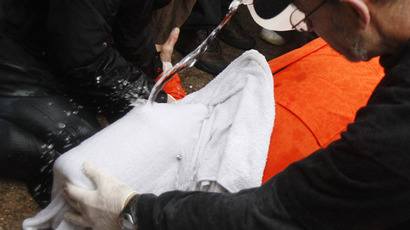Interrogation of Guantanamo Diary’s author was approved by Donald Rumsfeld – book’s editor
Mohamedou Ould Slahi’s interrogation plan was “meticulously designed ahead of time and was signed off and approved by the then Secretary of Defense Donald Rumsfeld,” according to the editor of the diary Larry Siems.
The 44-year old Mauritian national, who is one 122 detainees still being held at the controversial detention facility, was one of two “so-called special projects,” for whom an individualized interrogation strategy was developed, Siems explained in an interview with RT.
The heavily redacted book went on sale Tuesday after a six-year legal battle with the US government, who had it classified as a “secret” document.
Written by hand during the summer and autumn of 2005, the diary chronicles the physical and psychological torture Slahi endured at the hands of his interrogators, giving a human face to last year’s revelations of CIA torture in a highly publicized US Senate report.
The interrogation program endured by Slahi included sexual abuse, sleep deprivation, extreme cold, a simulated kidnapping, and a simulated execution.
“I was literally living in terror,” he writes, noting that he was denied sleep for over 2 months. “For the next 70 days I wouldn’t know the sweetness of sleeping: interrogation 24 hours a day, three and sometimes four shifts a day.”
Slahi has admitted to fighting with al-Qaeda when they were backed by the US during their struggle with the Soviet Union, but claims that he left the group in 1992. He was arrested in 2001, and transferred to Guantanamo in 2002.
In an interview with RT, Slahi’s lawyer Nancy Hollander stressed that he has never even been charged with a crime. In 2010, a judge granted a petition for his release, but it was never implemented.
“The judge said there was no evidence in 2010 to hold him. There’s certainly not evidence now. The Chief Prosecutor said when he resigned in 2007, that there was no evidence then.”
Hollander believes that Rumsfeld should be put to trail for approving the torture inflicted on Slahi and other inmates.
“It was the Secretary of Defense who ordered these special interrogation measures against Mohamedou that actually were torture,” she said. “He’s the one that’s responsible. I believe that the government of the United States should begin to pursue prosecutions against those people who have committed torture.”
Siems describes some of the heavy redaction the book faced before publication. In what he calls “one of the most absurd moments of censorship in the book,” a poem Slahi gives one of interrogators and then transcribes into his diary is redacted in its entirety.
Siems has stressed “it’s important to remember [Slahi] actually gave that information and the government is taking it away again.”














